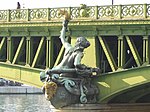Jean Antoine Injalbert
Jean-Antoine Injalbert | |
|---|---|
 | |
| Born | 3 February 1845 Béziers, France |
| Died | 20 January 1933 (aged 87) Paris, France |
| Known for | Sculpture |
Jean-Antoine Injalbert (1845–1933) was a much-decorated French sculptor, born in Béziers.
Life
[edit]The son of a stonemason, Injalbert was a pupil of Augustin-Alexandre Dumont and won the prestigious Prix de Rome in 1874. At the Exposition Universelle of 1889 he won the Grand Prix, and in 1900 was a member of the jury. On the day of the inauguration of the Pont Mirabeau in Paris, Injalbert was made an officer of the Légion d'honneur. In 1905 he was made a member of the Institut de France, and in 1910 promoted to Commander of the Légion d'honneur.
His work shows powerful imagination and strong personality, as well as great knowledge. From about 1915 onwards he became influential as a teacher, at the Académie Colarossi and as chief instructor at the École des Beaux Arts. Among his many students were Prague sculptor František Bílek, Alfred Janniot, Fernand Guignier, Gleb W. Derujinsky and the American sculptor Edward McCartan,[citation needed] and Aaron Goodelman.[1]
Many of his works are in the "Hôtel Fayet" - one of the three "Musée Des Beaux-Arts" in Béziers - and the "Villa Antonine", his old family home and summer studio.
Work
[edit]
- four allegorical figures on the Pont Mirabeau, Paris: The City of Paris, Navigation, Commerce and Abundance, 1896
- monument to Molière at Pézenas, 1897
- Crucifixion, at the Cathedral of Rheims, 1898
- Bordeaux and Toulouse, allegorical statues for the Gare de Tours, 1898, for architect Victor Laloux
- tympanum depicting the city of Paris surrounded by muses, Petit Palais Paris, circa 1900
- allegorical figures of the Loire and the Cher rivers, for the Hôtel de Ville, Tours, for Laloux, c. 1900
- figures of Electricity and Commerce on the Pont de Bir-Hakeim, Paris, 1905
- Monument to the Dead, Béziers, 1925
- Hippomenes at the Jardin du Luxembourg, Paris
- Eve After the Fall, in Montpellier
- monument to Sadi-Carnot in Sète
- Love Conquering the Lion, Fame, The Laughing Child and several others, in Béziers
- figure of Honoré Mirabeau at the Panthéon (Paris)
- bust of Louis Gallet, in Valence, Drôme
Images
[edit]-
Entrance to the Petit Palais, Paris
-
Navigation at the Pont Mirabeau
-
Monument to Pierre Puget, Toulon
See also
[edit]References
[edit]- ^ SAAM. "Aaron J. Goodelman". Smithsonian American Art Museum. Retrieved March 5, 2021.
Sources
[edit]- This article incorporates text from a publication now in the public domain: Gilman, D. C.; Peck, H. T.; Colby, F. M., eds. (1905). New International Encyclopedia (1st ed.). New York: Dodd, Mead.
{{cite encyclopedia}}: Missing or empty|title=(help)
External links
[edit]- Hôtel Fayet
- Villa Antonine
- Jean Antoine Injalbert in American public collections, on the French Sculpture Census website
- 1845 births
- 1933 deaths
- People from Béziers
- Members of the Académie des beaux-arts
- Academic staff of the École des Beaux-Arts
- French architectural sculptors
- Prix de Rome for sculpture
- Commanders of the Legion of Honour
- 20th-century French sculptors
- 19th-century French sculptors
- French male sculptors
- Members of the Ligue de la patrie française
- 19th-century French male artists
- French sculptor stubs




